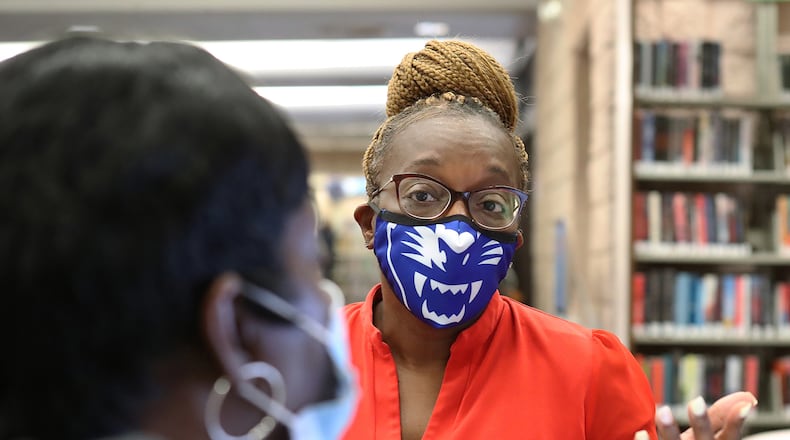Lucy Johnson didn’t know what to think when her university’s social work program placed her as an intern in the Gwinnett County library system.
It had been so long since Johnson set foot in a branch that she didn’t even have a library card. And anyway, she thought, what do social workers do in libraries?
“I was a little skeptical at first,” Johnson said.
But she quickly saw the need. People came into the library for all kinds of reasons — help applying for unemployment insurance or Medicaid, use of computers and the internet, or just for shelter from the heat or cold.
And through the pandemic, libraries have been a distribution point for food and other resources.
“Frankly, I wish every library had a social worker in it,” said Heidi Eveleigh, program manager of the Motel2Home program with St. Vincent de Paul.
If Renanda Dear had her way, they might.
Dear, director of field education for the School of Social Work at Georgia State University, hopes the internship program she pioneered in Gwinnett will expand to other parts of metro Atlanta. She wants to move into DeKalb County next, as well as into Fulton County.
The students work 16 hours a week educating librarians, meeting with residents and making connections in the community. Dear said they’re supervised by library staff and social work faculty field liaisons from the university.
In libraries, Dear said, social workers have an opportunity to reach people who might not be comfortable walking into a nonprofit to ask for help.
“There’s no stigma attached,” she said of going to the library. “Libraries have created a space where community members feel welcome. ... There’s no shame to come to the library. Everybody comes to the library.”
Eveleigh said the Motel2Home program gets most referrals through word-of-mouth, and several have come from the Norcross library. When social workers can meet people where they are, she said, people who need help are more receptive.
The partnership between Georgia State University and the Gwinnett library to place social workers in branches started in 2019, before the coronavirus pandemic. But the program has paid dividends throughout 2020, said Margaret Penn, director of branch services for the Gwinnett County Public Library.
Those dividends were apparent even during periods over the past year when branches were closed, she said.
“Libraries are seen as a safe place,” Penn said. “I certainly think there’s the potential there that we change as the community changes. Based on what we see now, we think there will be continued needs.”
The trend of putting social workers in libraries has been escalating for the past several years, said Michelle Jeske, the president of the Public Library Association and the executive director of the Denver Public Library. The first were in San Francisco in 2009, she said. Denver now has four.
No other metro Atlanta libraries have social workers, but Jeske said the Athens-Clarke County Library does.
Social workers help people like Nikol Hines, who said she came into the Norcross branch with a precarious housing situation. Andrea Devereux, a social work intern getting her Master’s degree, helped Hines build her confidence and Hines found a work opportunity with housing in Alabama.
“Had I not known her, it would‘ve took me a lot longer to get where I am now,” Hines said.
Devereux said she became a “mobilized social services unit” over the course of her internship. She distributed food in Buford, helped a Dacula patron register for doctor’s appointments, aided residents in repairing their credit scores and built connections with people like Hines in Norcross.
“You can reach so many lives with these resources,” Devereux said. “I think the library is the hub to reach the community. What better place to have it?”
Jeske, with the library association, said libraries are “a natural place” for people to receive services. Sara Zettervall, a librarian and consultant for Whole Person Librarianship, said libraries have become “a net that catches people who have no other place to land during the day.”
“As far as anybody else knows, they could be walking in there because they need the latest James Patterson,” Zettervall said. “People are going to be reached a lot more easily in a setting like the library.”
About the Author
The Latest
Featured

